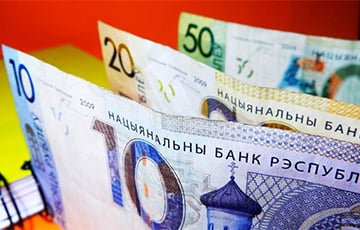Economist: Lukashenka Leads To Belarusian Ruble Collapse
28- 13.11.2024, 10:54
- 28,778

The case of Prokopovich lives and wins.
The authorities promise to increase pensions and salaries, introduce new social benefits, and abolish restrictions on working pensioners. According to experts, these are Aliaksandr Lukashenka's "political gestures" for the upcoming "elections". But is there a real economic basis for fulfilling of these promises? Belsat talked about this with economist Aliaksei Kharkevich.
According to Aliaksei Kharkevich, to answer this question, you need to decide from what perspective to look at it. In the short term, the economist believes, there are grounds for ensuring all Lukashenka's promises, because today we see that wages have been growing for quite a long time. Contributions to the Social Protection Fund are paid from these salaries. And of course, "here and now" funds must be available in order to be able to increase social benefits.
“But the question is different. This increase in wages is not supported by economic indicators, the growth rate of the gross added product, so in the long term it will not be able to continue for a long time. This is rather a political gesture to the upcoming elections, "believes Aliaksei Kharkevich.
At the same time, the distribution of unsupported money in the long term can lead to the fact that money will eventually lose its former value, the economist believes.
"In fact, we have already experienced this several times, it very often coincided with the presidential election, when after them there was a collapse of the Belarusian ruble exchange rate. So, step by step, the prospect is created for this to happen again, "the Belsat source says.
In order to understand the period in which one should expect the difficulties that the Belarusian economy will face, it is necessary to take into account many factors that affect this, according to Aliaksei Kharkevich.
In this regard, it is difficult to make forecasts, since there is nothing to make comparisons with. After all, Belarus used to be a little open economy, and the collapse of the Belarusian ruble had a negative impact on citizens, but positively – on enterprises, as their products became competitive in foreign markets. Therefore, this was logical, and those one-time falls were also caused by the foreign policy situation – that is, the need to enter some priority markets for potash, metal and other positions, the sale of which plays a significant role for the Belarusian budget, Kharkevich notes.
Now the situation has changed, as the external relations of Belarus have become more one-sided and are reduced to the eastern direction, so it is quite difficult to predict how the situation will develop this time, because the Belarusian economy is strongly tied to Russia. Perhaps, binding to Russia will neutralize the need for the collapse of the Belarusian ruble in the interests of Belarusian enterprises and this will be more smooth, the source admits.
In addition, the expert believes, we have entered a new electoral cycle and are witnessing a change in the administration of the White House, and many other factors that make it difficult to predict how the Belarusian economy will develop, Aliaksei Kharkevich emphasized.
As for decision-making in Lukashenka's entourage and the ability of some forces within the system to protect him from the empty distribution of money in order not to collapse the economy, then, according to the economist, it is necessary to understand that all decisions in the country are now made in one center. And all economic issues coexist with political ones – this is the case when it should be said that the economy begins to play a secondary role in comparison with politics.
"Therefore, I think, if there is a political need for this, then it is still possible to keep a higher level of salaries and social benefits for about a year. It will be more and more difficult to do this with each new month... But as soon as there is a political necessity, this collapse, as always, will be very sharp," the Belsat source stressed.











